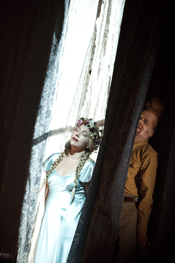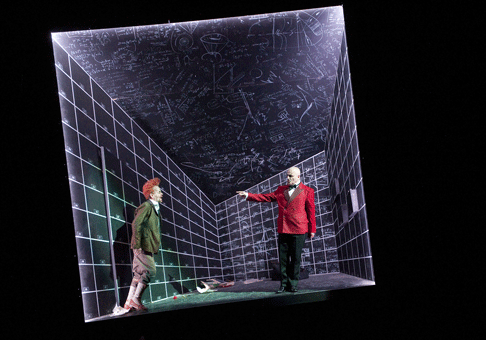09 May 2011
The Damnation of Faust, ENO
Terry Gilliam was one of the forces behind Monty Python, the popular British TV comedy of the 1970’s. His fans will flock in droves to his version of Berlioz’s The Damnation of Faust at the ENO, London.

Terry Gilliam was one of the forces behind Monty Python, the popular British TV comedy of the 1970’s. His fans will flock in droves to his version of Berlioz’s The Damnation of Faust at the ENO, London.
This production is great theatre, but it’s best approached as a Monty Python skit on the theme of Faust, with incidental soundtrack by Berlioz.
Gilliam’s take on Faust stems from it being a classic of German literature, overlooking the inconvenient fact that Berlioz was French and that Christopher Marlowe, who was English, wrote an important play on the theme centuries before Goethe was even born. The Faust legend has universal resonance, which is why it’s an icon. But Gilliam narrows the focus down to Germany and to the Third Reich. In principle, there’s no reason why it shouldn’t be updated in this way, but it would take a director of genuine vision and insight to develop the concept properly. Gilliam, however, isn’t bothered with veracity as long as he can tell a good story. The problem is that the Nazis and the Holocaust should be much more than props in a feelgood musical.
 Christine Rice as Marguerite and Peter Hoare as Faust
Christine Rice as Marguerite and Peter Hoare as Faust
Gilliam’s The Damnation of Faust reveals itself in a series of tableaux, each of them recognizable images from German art. Beautiful reconstruction of a Romantic painting, a reference to a famous cartoon of the First World War, vignettes from Georg Grosz, and a montage from the films of Leni Reifenstahl. They enfold like pictures in a short illustrated guide to Germany, compiled for illiterates. If we can avoid things like the Holocaust ever happening again, we need to understand the real complexities that brought them about. Comic book cleverness ultimately demeans knowledge, for it substitutes cliché for real thought. Totalitarianism thrives on lazy minds.
Faust (Peter Hoare) sports an upright shock of orange hair. Is this a reference to Peter Sellars? Apart from vague references to books on shelves, there’s precious little of Faust as scientist or idealist in this production. Faust becomes a SA brownshirt, the type whose resentment of intellectuals drove them to burn books. Marguerite (Christine Rice) becomes orthodox Jewish, undressing and swapping wigs while standing before a brightly lit menorah on the Sabbath eve. It’s no surprise that Faust ends up crucified on a swastika cross. Such images have shock value, but unless they’re integrated into an overall vision, they became little more than cheap entertainment.
Perhaps Gilliam is a comedian and is having a joke. But the indications are that he’s taking it all too portentously. “My struggle” says Mephistopheles (Christopher Purves) “Mein Kampf”. The audience obediently titters. Marguerite is shown as Brünnhilde on a rock, surrounded by flames. Faust does a comic impression of Siegfried. While connections between Faust and the Ring do exist, in this production they’re happened upon by accident, no more thought through than some sensationalist yellow press scandal. It’s enough here that Hitler liked Wagner, ergo Wagner was Third Reich.
While Gilliam wasn’t involved in Fawlty Towers, the spin off TV series that followed Monty Python, he falls back on the same mindless xenophobia that infects a large part of the population. The central character in the TV show was obsessed by Germans and the war, unable to think of people as people, only as caricatures. It was too persistent to be satire, and reinforced stereotypes by making them seem like harmless fun. The audience reaction to Gilliam’s gimmicks showed that perhaps Britain hasn’t matured in 30 years.
Significantly, Berlioz’s The Damnation of Faust isn’t an opera but a hybrid from which voices emerge from an orchestral fantasy. This doesn’t preclude staging, and indeed the long passages without text allow greater freedom of interpretation than might normally be the case. But fundamentally, there’s no point in any staging at all if it disregards the original. Berlioz’s orchestral writing is so vividly dynamic that it “is” the drama, the vocal parts devoted to vignettes like “King of Thule” song and “The Flea”. The visuals in this production were so hyperactive that at times, the cast had to slow themselves down not to lose synch with the music.
In a recent interview Gilliam is qouted as saying “Berlioz was crackers, he suffered like I do”. Wagner comes off even worse. Gilliam would cut out the recitatives in the Ring. Yet with metaphysics and subtle complexities expunged, neither Berlioz nor Wagner would be what they are. Just as there’s no real engagement with German history in this production, there’s no real engagement with the music.
 Peter Hoare as Faust and Christopher Purves as Mephistopheles
Peter Hoare as Faust and Christopher Purves as Mephistopheles
Superb singing from Christine Rice, way above the level of the rest of the cast. There were momentary lapses elsewhere, the tessitura being to high for Hoare, and the legato unbalanced by clumsy translation. No jokes in the English text this time, for they’d compete with what was happening on stage. Purves and Nicholas Folwell (Brander) were reliable, both parts depending on acting skills as much as on singing. Because the orchestral parts were so critical to Berlioz, it was a balm that Edward Gardner conducted the ENO orchestra well.
The irony of Gilliam’s Damnation of Faust is that audiences who might otherwise howl with rage at more original, challenging work will applaud Gilliam’s indifference to the original. Self referential gags are peppered throughout the production so the audience don’t forget they’ve come for Monty Python, not Goethe or Faust. This is an example of the much maligned but usually misunderstood “Director opera” with a vengeance, but audiences take it because the director happens to be someone popular (and not German). Thus it won’t be damned but lauded.
In Mel Brooks’s 1968 classic, The Producers, two con men cook up the worst possible musical so it will fail and they can run off with investors’ money. The show within the movie is Springtime for Hitler, complete with high stepping SS men. Against all reason, the audience loves it and the show becomes a hit. The Producers was a satire on the gullbility of the public. As long as there’s a song and a dance, people will follow anything.
For more details, please see the ENO website HERE.
For a full download of a performance of Berlioz The Damnation of Faust, with Nicolai Gedda and Marilyn Horne (1968) please see HERE.
Anne Ozorio